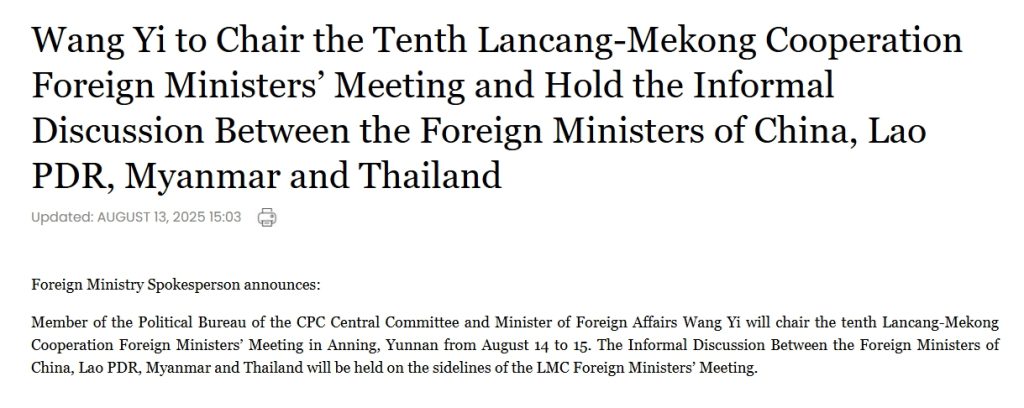China hopes to work with Mekong countries at the LMC Foreign Ministers’ Meeting to plan for future devt of mechanism: FM

When asked to offer some background information on the 10th Lancang-Mekong Cooperation (LMC) Foreign Ministers' Meeting and China's consideration for holding the Informal Discussion Between the Foreign Ministers of China, Lao PDR, Myanmar and Thailand, a Chinese Foreign Ministry spokesperson said on Wednesday that China hopes to work with the Mekong countries at the LMC Foreign Ministers' Meeting to review the outcomes of cooperation, take stock of success experience, and plan for future development of the mechanism.
Marking its 10th anniversary this year, the Lancang-Mekong Cooperation mechanism reflects the shared aspirations of Mekong countries, and shows its lasting appeal and influence regionally and internationally, a Chinese expert told the Global Times on Wednesday.
Chinese Foreign Ministry spokesperson announced on Wednesday that member of the Political Bureau of the CPC Central Committee and Minister of Foreign Affairs Wang Yi will chair the tenth Lancang-Mekong Cooperation Foreign Ministers' Meeting in Anning, Yunnan from August 14 to 15. The Informal Discussion Between the Foreign Ministers of China, Lao PDR, Myanmar and Thailand will be held on the sidelines of the LMC Foreign Ministers' Meeting.
The LMC is an innovative type of regional cooperation mechanism among China, Cambodia, Lao PDR, Myanmar, Thailand and Vietnam featuring collaboration, consultation and shared benefit. Under the strategic guidance of the leaders of the six countries, the Mekong countries have successively announced with China the building of a community with a shared future, which means that countries in the region have all been committed to building a community with a shared future both bilaterally and multilaterally under the LMC mechanism.
Connectivity across land, sea, air and the cyberspace has been enhanced, cross-border trade, investment, and industrial and supply chain cooperation continued to deepen, and cultural and people-to-people exchanges have flourished, fostering ever-closer bonds among our peoples, Foreign Ministry spokesperson said.
The six countries have cultivated the Lancang-Mekong spirit of development first, equal consultation, practicality and high efficiency, and openness and inclusiveness, and worked together to build a Lancang-Mekong home that shares weal and woe in solidarity.
This year marks the 10th anniversary of the Lancang-Mekong Cooperation mechanism. All Lancang-Mekong countries are now at a crucial stage of accelerated development. Facing a volatile international landscape and the rise of unilateralism, hegemony and protectionism, the Lancang-Mekong countries need to strengthen unity, enhance cooperation, and promote common development, the spokesperson added.
The spokesperson said that China hopes to work with the Mekong countries at the LMC Foreign Ministers' Meeting to review the outcomes of cooperation, take stock of success experience, and plan for future development of the mechanism, so as to build a more resilient Lancang-Mekong Economic Development Belt and an even closer Lancang-Mekong community with a shared future, providing greater stability and new driving forces for improving the well-being of people and promoting sustainable development in the region.
The 10th anniversary of the mechanism underscores its practical relevance and sustainability, reflecting the shared aspirations of people in Mekong countries, and demonstrates its enduring appeal, influence and cohesion at both regional and international levels, Xu Liping, director of the Center for Southeast Asian Studies at the Chinese Academy of Social Sciences, told the Global Times.
The expert noted that key aspects of cooperation could include enhancing connectivity in infrastructure and people-to-people exchanges, strengthening the resilience of regional industrial and supply chains and achieving deeper integration, and promoting the development of the Lancang-Mekong Economic Development Belt.
Since 2015, the overall achievements of the Lancang-Mekong cooperation have been remarkable, particularly in economic development, livelihood improvement and cross-border collaboration, including water resource management. Notably, projects like the China-Laos Railway have emerged as iconic examples of the cooperation, said Ge Hongliang, deputy director of the College of ASEAN Studies at Guangxi University for Nationalities.
Such established cooperation frameworks, such as water resource cooperation, agricultural cooperation, and poverty reduction, are conventional topics that could be discussed during the meeting, Xu said.
On the sidelines of the LMC meeting, as proposed by Thailand, the co-chair of the LMC, the Informal Discussion Between the Foreign Ministers of China, Lao PDR, Myanmar and Thailand will be held for an in-depth exchange of views on the regional situation, jointly combating cross-border crimes and other issues of mutual interest and concern, according to the spokesperson.
Given that transnational crime is a significant issue in Mekong countries, there is need to enhance cross-border law enforcement cooperation, address enforcement barriers and improve the effectiveness of joint operations, especially in areas such as information collection and case tracking, Xu said.
Ge added that eliminating the breeding ground for telecom fraud remains a considerable challenge, which calls for deeper reflection within the Lancang-Mekong framework.